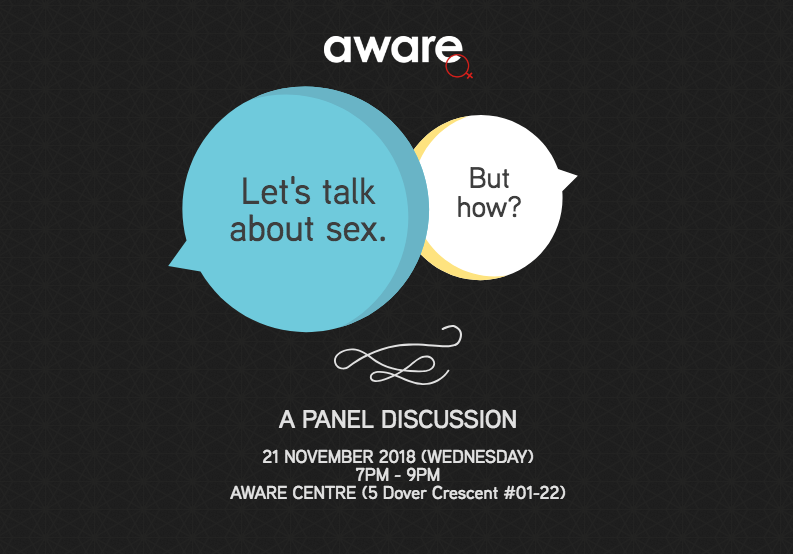-
Advocacy Theme
-
Tags
- Abortion
- Adoption
- Caregiving
- CEDAW
- Disability
- Domestic Violence
- Domestic Workers
- Harassment
- Healthcare
- Housing
- International/Regional Work
- Maintenance
- Media
- Migrant Spouses
- Migrant Workers
- Muslim Law
- National budget
- Parental Leave
- Parenthood
- Polygamy
- Population
- Race and religion
- Sexual Violence
- Sexuality Education
- Single Parents
- Social Support
- Sterilisation
- Women's Charter
A recap: Let’s talk about sex. But how?
December 11th, 2018 | Events, News, Sexual and Reproductive Health
By Christal Ong, AWARE intern

On the evening of 21st November 2018, more than 30 people gathered at AWARE to talk about sex education in Singapore. The crowd comprised of students, parents, and educators, along with four panellists who candidly shared their opinions and aspirations for how sex ed should look like in Singapore.
The panellists were Nithya Thanabalan, a university student; Tan Joo Hymn, a trainer at AWARE and parent; Mohamad Saiful bin Md Anuar, founder of Interverse and parent, and Lee Yi Ting, a trained sex-ed facilitator who works with Project X.
The session opened with a presentation of findings from a youth sexual health survey, conducted by AWARE in collaboration with students from Ngee Ann Polytechnic’s Diploma in Psychology Studies programme. They surveyed close to 800 young persons (16 to 25 years old).
While the survey showed that majority of youths rarely spoke to their parents regarding sexual matters, panelist Nithya represented the small minority whose parents actively initiated conversations about sex. “They did not impart any biases, and did not impose any negative moral values like ‘sex is harmful’,” she said. Her parents’ approach to sex ed allowed Nithya to form her own decisions and views toward sexual matters, which she is appreciative of.
Many participants agreed that sex ed was not informative enough, and was overly-focused on the concept of abstinence. The room cringed in unison upon finding out that some schools were still using judgemental and sexist analogies to demonstrate the consequences of sexual activity. One student observed that schools barely spent much time on sex ed, and others said that there should be a greater focus on “consent” in sex ed. Yi Ting pointed out that sex is always viewed through a heteronormative lens in class, and this resonated with the room which agreed that this issue was problematic.
Parents shared that they found it difficult to know when to talk to their children about sex, and felt shy and awkward when trying to explain acts of sex, anatomy, and body safety to their children. Joo Hymn, a parent of three herself, offered advice to communicate with children in an age-appropriate manner. “Use language and references that they can understand,” she said. To overcome the awkwardness, she recommended picking out informative and fun sex ed videos from Youtube to watch with the children, and “simply wait for the questions to come.” As a strong supporter of open and loving communication, she believes children tend to follow a parent’s values and instructions if approached in a less dictatorial manner. When asked if he reflected on his own values towards sex when conversing with his children, Saiful acknowledged that he did not want them to make the same mistakes that he did. However, he also highlighted the struggle of presenting a consistent view about sex, as he and the children’s mother held differing values toward sex and gender.
After the panel discussion, the Birds and Bees workshop was launched. Birds and Bees is an experiential workshop for parents, run by parents, to help participants start and sustain the important conversation about sex – in a non-judgmental way. Parents who are interested in the next run of the workshop can indicate your interest here.



